UNwanted, UNnecessary, UNdesirable
Page 19
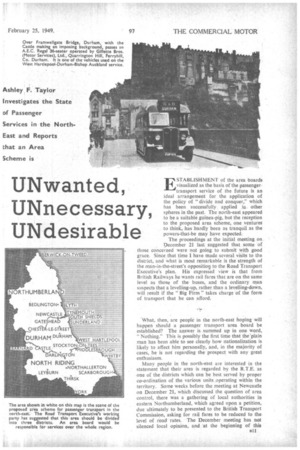
Page 20
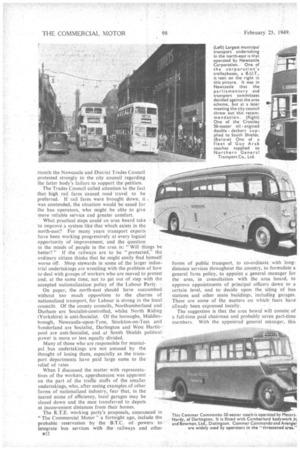
Page 21
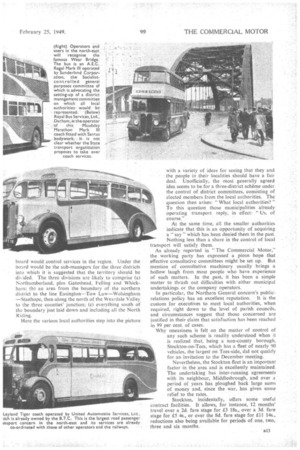
Page 22
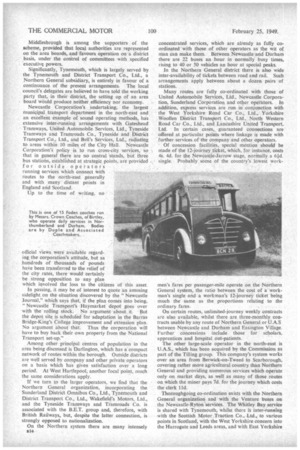
Page 23
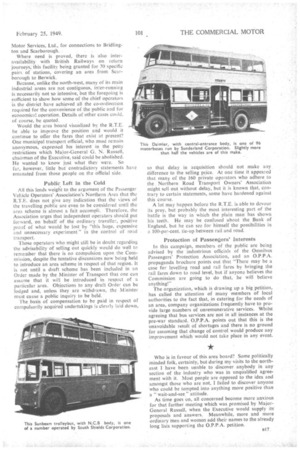
If you've noticed an error in this article please click here to report it so we can fix it.
E; ST A B L ISHM EN T of the area boards visualized as the basis of the passengertransport service of the future is an ideal arrangement for the application of the policy of "divide and conquer," which has been successfully applied in other spheres in the past. The north-east appeared to be a suitable guinea-pig, but the reception to the proposed area scheme, one ventures to think, has hardly been as tranquil as the powers-that-be may have expected.
The proceedings at the initial meeting on December 21 last suggested that some of those concerned were nat going to submit with good grace. Since:that time I have made several visits to the district, and what is most remarkable is the strength of the man-in-the-street's opposition to the Road Transport Executive's plan. His expressed view is that from British Railways he wants rail fares that are on the same level as those of the buses, and the ordinary man suspects that a levelling-up, rather, than a levelling-down, will result if the "Big Firm" takes charge of the form of transport that he can afford.
What, then, are people in the north-east hoping will happen should a passenger transport area board be established? The answer is. summed up in one word, " Nothing." This is possibly the first time that the plain man has been able to see clearly how nationalization is likely to affect him personally, and, in the majority of cases, he is not regarding the prospect with any great enthusiasm.
Many people in the north-east are interested in the statement that their area is regarded by the R.T.E. as one of the districts which can be best served by proper co-ordination of the various units .operating within the territory. Some weeks before the meeting at Newcastle on December 21, which discussed the question of area control, there was a gathering of local authorities in eastern Northumberland, which agreed upon a petition, due ultimately to be presented to the British Transport Commission, asking for rail fares to be reduced to the level of ioaci rates. The December meeting has not silenced local opinion, and .'at the beginning of this month the Newcastle and District Trades Council protested strongly to the city council regarding the latter body's failure to support the petition.
The Trades Council called attention to the fact that high rail fares caused road travel to be preferred. If rail fares were brought down, it was contended, the situation would be eased for the bus operators, who might be able to give more reliable service and greater comfort.
What practical steps could an area board take to improve a system like that which exists in the north-east? For many years transport experts have been working progressively at every logical opportunity of improvement, and the question in the minds of people in the area is: "Will things be better?" If the railways are to be "protected," the ordinary citizen thinks that he might easily find himself worse off. Shop stewards in some of the larger industrial undertakings are wrestling with the problem of how to deal with groups of workers who are moved to protest and, at the same time, not to get out of step with the accepted nationalization policy of the Labour Party.
On paper, the north-east should have succumbed without too much opposition to the charms of nationalized transport, for Labour is strong in the local councils. Of the county councils, Northumberland and Durham are Socialist-controlled, whilst North Riding (Yorkshire) is anti-Socialist. Of the boroughs, Middlesbrough, Newcastle-upon-Tyne, Stockton-on-Tees and Sunderland are Socialist, Darlington and West Hartlepool are anti-Socialist, and _at South Shields political power is more or less equally divided.
Many of those who are responsible for municipal bus undertakings are not amused by the thought of losing them, especially as the transport departments have paid large sums to the relief of rates.
When I discussed the matter with representatives of the workers, apprehension was apparent on the part of the traffic staffs of the smaller undertakings, who, after seeing examples of other forms of nationalized industry, fear that, in the Sacred name of efficiency, local garages may be closed down and the men transferred to depots at inconvenient distances from their homes.
The R.T.E. working party's proposals, announced in "The Commercial Motor" a fortnight ago, include the probable reservation by the -B-.T.C. of. powers to integrate bus services with the• railways and other
B12 forms of public transport, to co-ordinate with longdistance services throughout the country, to formulate a general fares policy, to appoint a general manager for the area, in consultation with the area board, to approve appointments of principal officers down to a certain level, and to decide upon the siting of bus stations and other main buildings, including garages. These are some of the matters on which fears have arready been expressed locally.
The suggestion is that the area board will consist of a full-time paid chairman and probably seven part-time members. With the appointed general manager, this
board would,control services in the region. Under • the board would be the sub-managers for the three districts into which it is suggested that the territory should be divided. The three divisions are likely to comprise (a) Northumberland, plus Gateshead, Felling and Whickham; (b) an area from the boundary of the northern" district to the line Easington—Tow Law—Wolsingham —Stanhope, then along the north of the Weardale
to the three counties' junction; (c) everything south of the boundary just laid down and including all the North Riding.
Here the various local authorities step into the picture with a variety of ideas for seeing that they and the people in their localities should have a fair deal. Unofficially, the most generally agreed idea seems to be for a three-district scheme under the control of district committees, consisting of elected members from the local authorities. The question then arises: " What local authorities? " To this question those municipalities already• operating transport reply, in effect: " Us, of course." ' At the same time, all the smaller authorities indicate that this is an opportunity of acquiring a " say " which has been denied them in the past.
• Nothing less than a share in the control of local transport will satisfy them. .
As already reported in " The Commercial Motor," the working party has expressed a pious hope that effective consultative committees might be set up. But mention of consultative machinery usually brings a hollow laugh from most people who have experience of such matters. In the past, it has been a simple matter to thrash out difficulties with either municipal undertakings or the company operators.
' In particular, the Northern General concern's public relations policy has an excellent reputation. It is the custom for executives to meet local authorities, when required, right down to the level of parish councils, and circumstances suggest that those concerned are justified in their claim that satisfaction has been reached in 99 per cent. of cases.
Why uneasiness is felt on the matter of control of any such scheme is readily understood when it is realized that, being a non-county borough, Stockton-on-Tees, which has a fleet of nearly 90 vehicles, the largest on Tees-side, did not qualify, for an invitation to the December meeting.
Nevertheless, the Stockton fleet is an important factor in the area and is excellently maintained. The undertaking has inter-running agreements with its neighbour, Middlesbrough, and over .a period of years has ploughed back large sums of money and, since the war, has given some relief to the rates.
Stockton, incidentally, offers some useful contract facilities. It allows, for instance, 12 months' travel over a 2d. fare Stage for £3 18s., over a 3d. fare stage for £5 4s., or over the 8d. fare stage for £11 14s., reductions also being available for periods of one, two, three and six months. Middlesbrough is among the supporters of the scheme, provided that local authorities are represented on the area boards, and favours operation on a district basis, under the control of committees with specified 'executive powers.
Significantly, Tynemouth, which is largely served by the Tynemouth and District Transport Co., Ltd., a Northern General subsidiary, is entirely in favour of a continuance of the present arrangements. The local council's delegates are believed to have told the working party that, in their district, the setting up of an area board would produce neither efficiency nor economy.
Newcastle Corporation's undertaking, the largest municipal transport department in the north-east and an excellent example of sound operating methods, has extensive inter-running arrangements with Gateshead Tramways, United Automobile Services, Ltd., Tyneside Tramways and Tramroads Co., Tyneside and District Transport Co, Ltd., and Bell's Services, Ltd., radiating to areas within 10 miles of the City Hall. Newcastle Corporation's policy is to run cross-city services, so that in general there are no central stands, but three bus stations, established at strategic points, are provided for outside operators running services which connect with routes to the north-east generally and with many distant points in England and Scotland.
Up to the time of writing, no official views were available regarding the corporation's attitude, but as hundreds of thousands of pounds have been transferred to the relief of the city rates, there would Certainly be strong opposition to any plan which involved the loss to the citizens of this asset.
In passing, it may be of interest to quote an amusing sidelight on the situation discovered by the "Newcastle Journal," which says that, if the plan comes into being, "Newcastle Transport's Haymarket depot goes over with the rolling stock. No argument about it. But the depot site is scheduled for adaptation in the Barras Bridge-King's College improvement and extension plan. No argument about that. Thus the corporation will have to buy back their own property from the National Transport set-up."
Among other principal centres of population in the area being discussed is Darlington, which has a compact network of routes within the borough. Outside districts are well served by company and other private operators on a basis which has given satisfaction over a long period. At West Hartlepool, another focal point, much the same considerations apply.
If we turn to the larger operators, we find that the Northern General organization, incorporating the Sunderland District Omnibus Co., Ltd., Tynemouth and District Transport Co., Ltd., Wakefield's Motors, Ltd., and the Tyneside Tramways and Tramroads Co. is associated with the B.E.T. group and, therefore, with British Railways, but, despite the tatter connection, is strongly opposed to nationalization.
On the Northern system there are many intensely B14 concentrated services, which are already as fully coordinated with those of other operators as the wit of man can make them. Between Newcastle aridDurham there are 22 buses an hour in normally' busy times, rising to 40 or 50 vehicles an hour at special peaks.
In the Northern General district there is also wide inter-availability of tickets between road and rail. Such arrangements apply between about a dozen pairs of stations.
Many routes are fully co-ordinated with those of United Automobile Services, Ltd., Newcastle Corporation, Sunderland Corporation and other operators. In addition, express services are run in conjunction with the West Yorkshire Road Car Co., Ltd., Yorkshire Woollen District Transport Co., Ltd., North Western Road Car Co., Ltd., and. Lancashire United Transport, Ltd. In certain cases,. guaranteed connections are offered at particular points where linkage is made with further services of the company and other operators.
Of concession facilities, special mention should be made of the 12-journey ticket, which, for instance, costs 4s. 4d. for the Newcastle-Jarrow stage, normally a Od. single. Probably some of the country's lowest work men's fares per pasenger-mile operate on the Northern General system, the ratio between the cost of a workman's single and a workman's I2-journey ticket being much the same as the proportions relating to the ordinary fares.
On certain routes, unlimited-journey weekly contracts are also available, whilst there are three-monthly contracts usable by any route of Northern General or U.A.S between Newcastle and Durham and Easingth n Village. Further concessions include those for scholar's. apprentices and hospital out-patients.
The other large-scale operator in the north-east is U.A.S., which has been acquired by the Commission as part of the Tilling group. This company's system works over an area from Berwick-on-Tweed to Scarborough, covering rather more agricultural country than Northern General and providing numerous services which operate only on market days, as well as many of those routes on which the miner pays 7d. for the journey which costs the clerk lid.
Thoroughgoing co-ordination exists with the Northern General organization and with the Venture buses on the Newcastle-Ryton services. The Whitley Bay service is shared with Tynemouth, whilst there is inter-running with the Scottish Motor, ,Traction Co., Ltd:, to various points in Scotland, with the West Yorkshire concern into the Harrogate and Leeds areas, and with East Yorkshire
Motor Services, Ltd., for connections to Bridlington and Scarborough.
Where need is proved, there is also interavailability with British Railways on return journeys; this facility being granted for 30 specific pairs of stations, covering an area froth Scarborough to Berwick.
Because, unlike the north-west, many of its main industrial areas are not contiguous, inter-running is necessarily not so intensive, but the foregoing is sufficient to show how some of the chief operators is the district have achieved all the co-ordination required for the convenience of the public and for economical operation. Details of other cases could, of course, be quoted.
Would the area board visualized by the R.T.E. be able to improve the position and would it continue to offer the fares that exist at present? One municipal transport official, who must remain anonymous, expressed his interest in the petty restrictions which Major-General G. N. Russell, chairman of the Executive, said could be abolished. He wanted to know just what they were. So far, however, little but contradictory statements have emanated from those people on the official side.
Public Left in the Cold All this lends weight to the argument of the Passenger Vehicle Operators' Association's Northern Area that the R.T.E. does not give any indication that the views of the travelling public are even-to be considered until the area scheme is almost a fait accompli. Therefore, the Association urges that independent operators should put forward, on behalf of the ordinary traveller, positive proof of what would be loa by "this huge, expensive and unnecessary experiment" in the control of road transport.
Those operators who might still be in doubt regarding the advisability of selling Out quickly would do well to remember that there is no compulsion upon the Commission, despite the tentative discussions now being held to introduce an area scheme in respect of that region. It is not until a draft scheme has been included in an Order made by the Minister of Transport that one can assume that it will be introduced in respect of a particular area. Objections to any draft Order can be lodged and, unless they are withdrawn, the Minister must cause a public inquiry to be held.
The basis of compensation to be paid in respect of compulsorily acquired undertakings is clearly laid down, so that delay in acquisition should not make any difference to the selling price. At one time it appeared that many of the 160 private operators who adhere to the Northern Road Transport Owners' Association might sell out without delay, but it is known that, contrary to certain statements, some have hardened against this course.
A lot may happen before the R.T.E. is able to devour its prey, but probably the most interesting part of the battte is the way in which the plain man has shown his teeth. He may be confused about the Bank of England, but he can see for himself the possibilities in a 100-per-cent. tie-up between rail and road.
Protection of Passengers' Interests In this campaign, members of the public are being advised by the industrious officials of the Omnibus Passengers' Protection Association, and an 0.P.P,A. propaganda brochure points out that -There may be a case for levelling road and rail fares by bringing the rail fares down to road level, but if anyone believes the Commission are going to do that, he will believe anything!"
The organization, which is drawing up a big petition, has called the attention of many members of local authorities to the fact that, in catering for the needs of an area, company organizations frequently have to provide large numbers of unremunerative services. Whilst agreeing that bus services are not in all instances at the pre-war standard, 0,P.P.A. points out that this is the unavoidable result of shortages and there is no ground for assuming that change of control would produce any improvement which would not take place in any event.
Who is in favour of this area board? Some politically minded folk, certainly, butduring my-visits to the northeast I have been unable to discover anybody in any section of the industry who was in unqualified agreement -with it. Most people are opposed to the idea and amongst those who are not, I failed to discover anyone who could be tempted into anything more positive than a "wait-and-see." attitude.
As time goes on, all concerned become more anxious for that further meeting which was promised by MajorGeneral Russell, when the Executive would supply its proposals and answers. Meanwhile, more and more ordinary Men and women add their names to the already long lists supporting the O.P.P.A. petition.




























